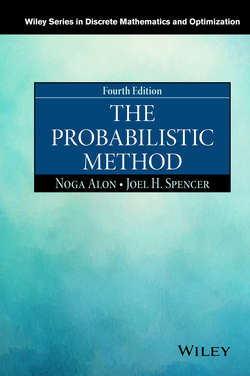Описание книги
Praise for the Third Edition “Researchers of any kind of extremal combinatorics or theoretical computer science will welcome the new edition of this book.” – MAA Reviews Maintaining a standard of excellence that establishes The Probabilistic Method as the leading reference on probabilistic methods in combinatorics, the Fourth Edition continues to feature a clear writing style, illustrative examples, and illuminating exercises. The new edition includes numerous updates to reflect the most recent developments and advances in discrete mathematics and the connections to other areas in mathematics, theoretical computer science, and statistical physics. Emphasizing the methodology and techniques that enable problem-solving, The Probabilistic Method, Fourth Edition begins with a description of tools applied to probabilistic arguments, including basic techniques that use expectation and variance as well as the more advanced applications of martingales and correlation inequalities. The authors explore where probabilistic techniques have been applied successfully and also examine topical coverage such as discrepancy and random graphs, circuit complexity, computational geometry, and derandomization of randomized algorithms. Written by two well-known authorities in the field, the Fourth Edition features: Additional exercises throughout with hints and solutions to select problems in an appendix to help readers obtain a deeper understanding of the best methods and techniques New coverage on topics such as the Local Lemma, Six Standard Deviations result in Discrepancy Theory, Property B, and graph limits Updated sections to reflect major developments on the newest topics, discussions of the hypergraph container method, and many new references and improved results The Probabilistic Method, Fourth Edition is an ideal textbook for upper-undergraduate and graduate-level students majoring in mathematics, computer science, operations research, and statistics. The Fourth Edition is also an excellent reference for researchers and combinatorists who use probabilistic methods, discrete mathematics, and number theory. Noga Alon, PhD, is Baumritter Professor of Mathematics and Computer Science at Tel Aviv University. He is a member of the Israel National Academy of Sciences and Academia Europaea. A coeditor of the journal Random Structures and Algorithms, Dr. Alon is the recipient of the Polya Prize, The Gödel Prize, The Israel Prize, and the EMET Prize. Joel H. Spencer, PhD, is Professor of Mathematics and Computer Science at the Courant Institute of New York University. He is the cofounder and coeditor of the journal Random Structures and Algorithms and is a Sloane Foundation Fellow. Dr. Spencer has written more than 200 published articles and is the coauthor of Ramsey Theory, Second Edition, also published by Wiley.
